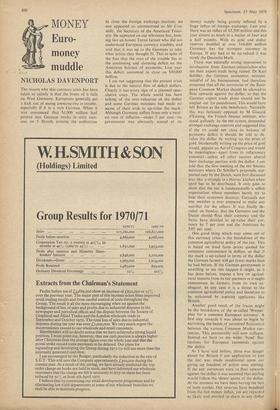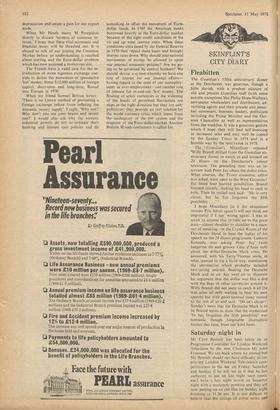MONEY
Euro-
money muddle
NICHOLAS DAVENPORT
The reason why this currency crisis has been taken so calmly is that the brunt of it falls on West Germany. Europeans generally get a kick out of seeing someone else in trouble. especially if it is a rich German. When it was announced that $1,000 million had poured into German marks in sixty min- utes on 5 March, causing the authorities to close the foreign exchange markets, no one appeared so unconcerned as Mr Con- nally, the Secretary of the American Treas- ury. He appeared on our television box, look- ing like an honest Texan farmer who did not understand European currency troubles, and said that it was up to the Germans to take what action they thought fit. This in spite of the fact that the root of the trouble lies in the continuing and alarming deficit on the American balance of payments. Last year this deficit amounted to close on $10,000 million.
I ant not suggesting that the present crisis is due to the natural flow of deficit dollars. Clearly it has every sign of a planned spec- ulative coup. The whole world has been talking of the over-valuation of the dollar and some German ministers had made no secret of their wish to up-value the mark. Although Germany suffers from only a mod- est rate of inflation—under 5 per cent—its government was obviously scared of its money supply being grossly inflated by a huge influx of foreign exchange. Last year there was an influx of $5,500 million and this year almost as much in a matter of four and a half months. With its gold and dollar reserves doubled at over $16,000 million Germany has the strongest currency in Europe. If any had to be up-valued it was surely the Deutsche Mark, There was naturally strong opposition to revaluation from German industrialists who see their export trade being ruined. Dr Karl Schiller, the German economics minister, mindful of his businessmen, had therefore proposed that all the currencies of the Euro- pean Common Market should be allowed to float upwards against the dollar, so that the German export trade alone should not' be singled out for punishment. This would have left Britain as the sole beneficiary. Naturally this was furiously opposed by M Giscard d'Estaing, the French finance minister, who stood gallantly by the IMF system, demanded stronger exchange controls and suggested that if the us could not close its balance of payments deficit it should be told to de- value the dollar by writing up the price of gold. Incidentally writing up the price of gold would require an Act of Congress and would be meaningless—apart from its inflationary potential—unless all other nations altered their exchange parities with the dollar. I am told that the first meeting of the EEC finance ministers where Dr Schiller's proposals, sup- ported only by the Dutch, were first discussed was like a wrangle in a thieves' kitchen when spoil has to be distributed. It only goes to show that the EEC is fundamentally a selfish organisation whose members barely try to hide their economic disarray. Certainly not one member is ever prepared to make any sacrifice for the others. It was finally de- cided, on Sunday, that the Germans and the Dutch should float their currency and the Swiss have decided to up-value their cur- rency by 7 per cent and the Austrians by 5.05 per cent.
One good thing which may come out of this currency crisis is the breakdown of the common agricultural policy of the EEC. This is based on fixed farm prices quoted for computer convenience in dollars, so that if the mark is up-valued in terms of the dollar the German farmer will get fewer marks than he had before. If the German government is unwilling to see this happen it might, as it has done before, impose a levy on agricul- tural imports from its EEC partners or it might compensate its farmers from its own ex- chequer. In any case it is a threat to the common agricultural policy and therefore to be welcomed by aspiring applicants like Britain.
Another good result of the fracas might be the breakdown of the so called 'Werner' plan for a common European currency, A first step towards it was about to begin by narrowing the bands of permitted fluctuation between the various Common Market cur- rencies. This presumably will now collapse. Instead we have to see wider 'band' fluc- tuations for European currencies against , the dollar.
As I have said before, there was danger ahead for Britain if our application to join the EEC was made conditional upon our giving up freedom of action over sterling. If the EEC currencies were to float upwards against the dollar it was assumed that sterling would follow the 'down' quote of the dollar. At the moment we have been having the best of both worlds. Our reserves have benefited from the hot money influx, yet are regarded as likely and entitled to share in any dollar depreciation and secure a gain for our export trade.
When Mr Heath meets M Pompidou shortly to discuss 'matters of common in- terest,' I hope that these vital economic and financial issues will be thrashed out. It is absurd to talk of our joining the Common Market before an understanding is reached about sterling and the Euro-dollar problem which has now assumed a monstrous size.
The French have a valid case for the in- troduction of more vigorous exchange con- trols to defeat the movement of speculative 'hot' money. Some $12,000 million of foreign capital, short-term and long-term, flowed into Europe in 1970.
When my friend Samuel Brittan writes: 'There is no known method of preventing a foreign exchange inflow from inflating the domestic money supply', I reply, 'Why not? Why don't you use your brains and invent one?' I would also ask why the western industrial powers do not co-ordinate their banking and interest rate policies and do something to offset the movement of Euro4 dollar funds. In 1969 the American banks borrowed heavily in the Euro-dollar market because of the tight credit conditions in the us and up went interest rates. When these conditions were eased by the Federal Reserve in 1970 they repaid these loans and brought interest rates down. Why should international movements of money be allowed to upset our internal economic policies? Are we go- ing to be governed by central bankers? We should devise a system whereby we have one rate of interest for our internal affairs— having regard to the state of our unemploy- ment or over-employment--and another rate of interest for in-and-out 'hot' money. The floating of select currencies or the widening of the bands of permitted fluctuation are steps in the right direction but they are only palliatives; they provide no real solution for the world currency crisis which stems from the inadequacy of the imt system and the eruption of the Euro-dollar market. Another Bretton Woods conference is called for.







































 Previous page
Previous page